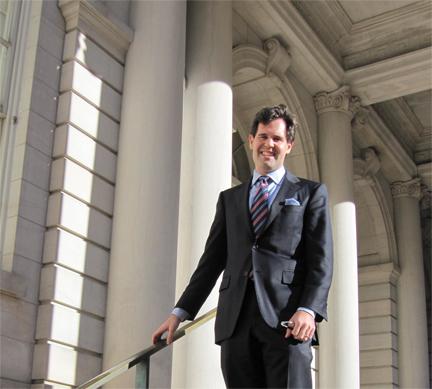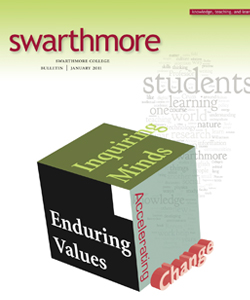A (Big) Apple a Day
Jordan Brackett ’01 works to keep New Yorkers eating healthy.
 In his first year as an adviser to New York Mayor Michael Bloomberg on food policy, Jordan Brackett is already making headlines. The City’s health commissioner’s proposal that he helped craft to ban the purchase of sugar-sweetened drinks with city food stamps has drawn cheers from public health advocates, protests from soft-drink industry lobbyists, and a wide range of responses in newspaper editorials around the country.
In his first year as an adviser to New York Mayor Michael Bloomberg on food policy, Jordan Brackett is already making headlines. The City’s health commissioner’s proposal that he helped craft to ban the purchase of sugar-sweetened drinks with city food stamps has drawn cheers from public health advocates, protests from soft-drink industry lobbyists, and a wide range of responses in newspaper editorials around the country.
Supporters see a new opportunity in the war against obesity and diabetes. “Food stamps should provide nutrition,” Brackett says. “Soda not only doesn’t provide nutrition, it’s literally killing people and making them sick. Government shouldn’t subsidize that while trying to fight it with other programs.” Many opponents of the proposal, on the other hand, see it as an overreach of government regulation.
Whichever side you’re on, you can’t fault Brackett (pictured on the steps of City Hall in New York City) for being timid. He credits his boldness to his own formative years at Swarthmore, where he twice served as student council president. In that role, Brackett worked closely with then-College President Al Bloom.
“Al was one of the more optimistic guys in the world,” Brackett says. “When I’d come to him with an idea about which other administrators might have said, ‘You’re crazy, get out of my office.’ But Al would say, ‘Well, you’re smart and hard-working, let’s see if we can make this happen.’ That can-do spirit gives me the confidence now to pitch things to higher-ups.”
Brackett’s path to food policy was circuitous. Upon graduating from Swarthmore, he attended law school and worked at two different corporate law firms. After four years, Brackett sensed that he needed a change. In search of guidance, he approached Jim Kurth, his one-time political science professor. Kurth encouraged him to look for a job that fit his personality—and helped to convince him that corporate law wasn’t it. “I realized I wanted to do something that I really had fun doing,” Brackett says. “The last time that I’d found fulfillment and enjoyment in my work was during my time at Swarthmore. I was trying to figure out how I could have that again.”
Brackett took an inventory of his passions, and food and politics came out at the top of the list. His break came when a mutual friend put him in touch with Ben Thomases ’97, the first food policy coordinator for the City of New York. Thomases was looking to hire a deputy and Brackett jumped at the opportunity. After Brackett began his new position, Thomases left City Hall to pursue an outstanding opportunity elsewhere. Although Brackett was sad to see Thomases leave, saying that he had done an extraordinary job, Brackett now had the chance to assume greater responsibility.
“For me,” Brackett says, “food is redeeming in and of itself. It’s a way to sit down with one’s family or friends. It helps foster a communitarian spirit.” As he immersed himself in food policy, however, he saw a darker side of food consumption—a growing national tendency toward poor diet choices, leading to high rates of chronic illness and soaring health costs. As Brackett brings his passion for food to bear on his work, he says, “The question is, how can we do scalable interventions that can help lead people to love food in a healthy way?”
In addition to the sugar-sweetened beverage proposal, Brackett also works on school-meal nutritional standards as well as incentives to encourage grocery stores to stay open in poorer neighborhoods.
Not long after Brackett took the job, he was called in to brief his new boss, Linda Gibbs, the deputy mayor of Health and Human Services. He took a seat at a table in the Mayor’s famous “bullpen”—a collection of unassuming cubicles where the city’s most powerful government officials work side-by-side. As he chatted with Gibbs, Brackett looked up to see Bloomberg, the financial news billionaire and constant subject of presidential campaign rumors, pouring himself a cup of coffee just a few feet away. Once again, as at Swarthmore, the most powerful man in the room—in this case, one of the most powerful men in the world—was listening to his ideas.
“Most people would assume that a guy like him isn’t pouring his own coffee,” Brackett says. Yet, Bloomberg’s cubicle is the same size as Brackett’s, and that of every other City employee in the building. Meetings are held in the open, fostering collaboration even at the highest levels. “It shows that there’s no hierarchy of ideas,” Brackett says. “Everyone can help make change.”
 Mike Agresta is a Philadelphia-based writer. He has published in Boston Review, Texas Observer, Philadelphia Weekly, and various alumni magazines and literary journals. Clients include major universities and nonprofit organizations. Agresta has an M.F.A. from the University of Texas–Austin and a B.A. from Columbia University.
Mike Agresta is a Philadelphia-based writer. He has published in Boston Review, Texas Observer, Philadelphia Weekly, and various alumni magazines and literary journals. Clients include major universities and nonprofit organizations. Agresta has an M.F.A. from the University of Texas–Austin and a B.A. from Columbia University.
 Email This Page
Email This Page